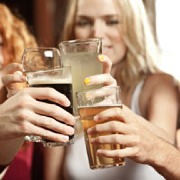Back To School: Eating Disorders On College Campuses
 For some teens, the prospect of going off to college can be an exciting time full of changes, adventure, discovery and growth. For many other young adults, the college experience may turn sour.
For some teens, the prospect of going off to college can be an exciting time full of changes, adventure, discovery and growth. For many other young adults, the college experience may turn sour.
College students can be exposed to endless stress, anxiety, alcohol abuse and eating disorders.
Eating Disorders and Campus Life
“Eating disorders have the highest mortality rate of any psychiatric disorder and a suicide rate that is 50 times higher than that of the general population,” states the National Association of Anorexia Nervosa and Associated Disorders (ANAD). The ANAD also points out that despite the high mortality rate and risk, college students receive little to no information on precautions, symptoms, treatment and counseling that could be available to them on campus.
Although women seem to be the most affected by eating disorders, there has been growth in the number of men who are susceptible to them as well. Many students are unwilling to seek support for these conditions because they do not seem like serious health issues, they are mistaken for anxiety or stress disorders, or because students are trying to hide them. Many young adults are also unwilling to seek treatment or are simply too embarrassed to seek out help.
Dangerous Combination
The ANAD suggests that there is a growing trend on campuses, one that combines drinking and eating disorders, known as “drunkorexia.” Although this has not been formally recognized as an eating disorder yet, many young adults are drinking often on an empty stomach in order to watch calories, something which can have serious consequences.
In a world that is saturated with weight-conscious advertising and media, young adults are going to great lengths to maintain seemingly fit bodies at an unhealthy cost. A study conducted by Adam Barry, a professor of health education and behavior at the University of Florida, showed that students who had vomited or used laxatives the previous month to shed pounds were 76 percent more likely to binge drink.
Students who engage in “drunkorexia” will skip meals throughout the day or exercise heavily to burn calories in order to make up for the calories that they will gain from a night of heavy drinking. However, health professionals agree that calories from alcohol and food are not interchangeable and that dieting in this way can be dangerous. Additionally, many students will avoid meals so that they are able to feel the effects of alcohol faster than normal.
Dr. Mark Peluso, director of the Middlebury College health center, points out that drinking on an empty stomach leads to more rapid absorption of alcohol as well as higher levels of impairment and intoxication. “Alcohol is a desert of nutrients compared to food,” points out Peluso. Taking part in this kind of activity can not only increase the risk of things like sexual assault, alcohol poisoning and substance abuse, but it can also cause long-term health issues like gastritis, ulcers and malnutrition.
Signs of ‘Drunkorexia’
It is important to look for the signs of this type of behavior:
- going to extreme lengths to avoid eating
- distorted body image
- obsessive dieting
- eating large amounts of food and then purging
- excessive exercise
- skipping meals before a night of drinking in order to avoid gaining weight
Watching out for these types of behaviors can mean the difference between a fun night of college partying and a trip to the hospital.
Sources: National Association of Anorexia Nervosa, The Atlantic
 Eating Disorder Self Test. Take the EAT-26 self test to see if you might have eating disorder symptoms that might require professional evaluation. All answers are confidential.
Eating Disorder Self Test. Take the EAT-26 self test to see if you might have eating disorder symptoms that might require professional evaluation. All answers are confidential.